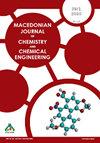Development of a spectrophotometric method for assessment of the relative reactivity of monocarbonyl analogs of curcumin with 2-(dimethylamino)ethanethiol
IF 1.1
4区 化学
Q3 CHEMISTRY, MULTIDISCIPLINARY
Macedonian Journal of Chemistry and Chemical Engineering
Pub Date : 2023-06-12
DOI:10.20450/mjcce.2023.2638
引用次数: 1
Abstract
In order to improve the bioavailability of curcumin, studies have been undertaken to prepare the so-called monocarbonyl analogs of curcumin (MACs) and assess their biological activity. These analogs contain an electrophilic α,β-unsaturated carbonyl moiety (Michael acceptor). Several key biological processes are connected/controlled with thiol alkylation (glutathione, cysteine, cysteine peptide residues). The most likely reaction is the Michael addition between the α,β-unsaturated acceptor and a corresponding thiol. 2,6-Bisarylidenecyclohexanone and 3,5-bisarylidenepiperidin-4-one scaffolds offer convenient tunability of electrophilicity and redox properties of the Michael acceptor by the introduction of various substituents. In this study, several MACs were prepared by Claisen-Schmidt condensation reaction, and their reactivity with 2-(dimethylamino)ethanethiol was evaluated. For this purpose, based on the UV-Vis spectra of the analogs and thiol(s), a proper method for spectrophotometric evaluation of their reactivity with 2-(dimethylamino)ethanethiol was optimized. The relative reactivity of the analogs was 7 > 2 > 5 > 4 > 1 ≈ 6. The developed method is simple, and it can be extended to assess the reactivity of other MACs.姜黄素单羰基类似物与2-(二甲氨基)乙硫醇相对反应性的分光光度法研究
为了提高姜黄素的生物利用度,研究人员对姜黄素的单羰基类似物进行了制备并对其生物活性进行了评价。这些类似物含有亲电的α,β-不饱和羰基部分(迈克尔受体)。几个关键的生物过程与巯基烷基化(谷胱甘肽、半胱氨酸、半胱氨酸肽残基)有关/控制。最可能的反应是α,β-不饱和受体与相应的硫醇之间的迈克尔加成反应。2,6-二芳基烯环己酮和3,5-二芳基烯外环苷-4-one支架通过引入各种取代基,方便地调节Michael受体的亲电性和氧化还原性质。本研究采用Claisen-Schmidt缩合反应制备了几种mac,并对其与2-(二甲氨基)乙硫醇的反应性进行了评价。为此,基于类似物和硫醇的紫外可见光谱,优化了其与2-(二甲氨基)乙硫醇反应性的分光光度评价方法。这些类似物的相对反应活性为7 > 2 >5 >4 >1≈6。该方法操作简单,可推广应用于其它MACs的反应性评价。
本文章由计算机程序翻译,如有差异,请以英文原文为准。
求助全文
约1分钟内获得全文
求助全文
来源期刊
CiteScore
1.60
自引率
20.00%
发文量
14
审稿时长
>12 weeks
期刊介绍:
Macedonian Journal of Chemistry and Chemical Engineering (Maced. J. Chem. Chem. Eng.) is an official publication of the Society of Chemists and Technologists of Macedonia. It is a not-for-profit open acess journal published twice a year. The journal publishes original scientific papers, short communications, reviews and educational papers from all fields of chemistry, chemical engineering, food technology, biotechnology and material sciences, metallurgy and related fields. The papers published in the Journal are summarized in Chemical Abstracts.

 求助内容:
求助内容: 应助结果提醒方式:
应助结果提醒方式:


